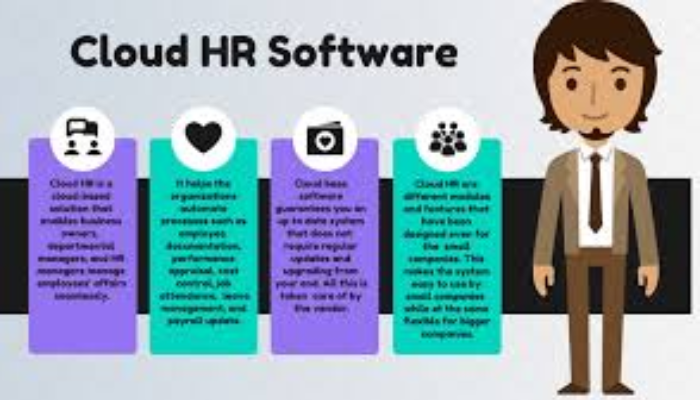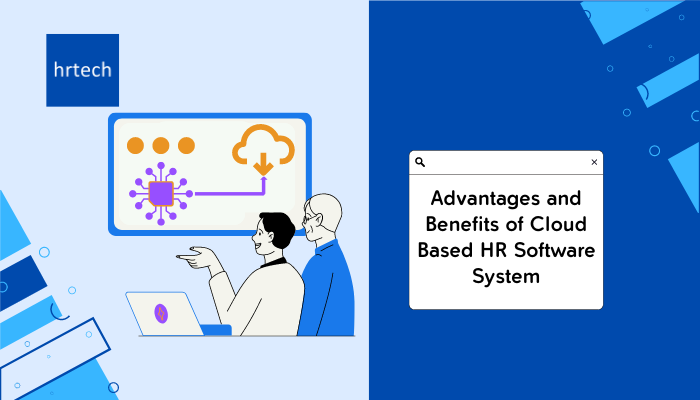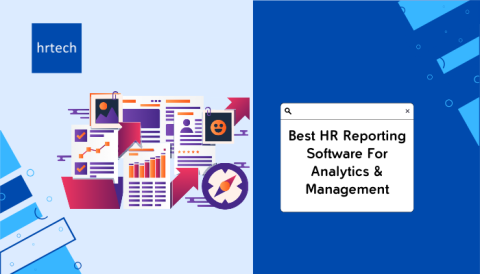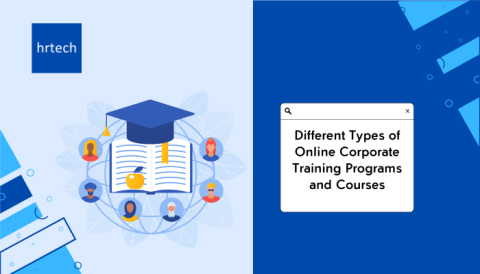Imagine an HR department that thrives on efficiency, not buried under a mountain of paperwork. Where talent acquisition is a breeze, and employee data is secure and accessible with a few clicks. Sounds like a fantasy, right? Not anymore. Cloud-based HR software is revolutionizing the way businesses manage their most valuable asset: their people.
Gartner, a leading research and advisory firm, forecasts that by 2027, 56% of organizations will utilize cloud-based software solutions for business growth.
What exactly is a cloud-based HR system?

It is a central hub for all your HR needs, hosted securely online. Gone are the days of clunky software installations and server maintenance. Cloud-based HR offers a user-friendly platform accessible anywhere, anytime, on any device. Organizations can enhance their operational agility and efficiency by leveraging cloud services to integrate HR processes seamlessly with other business functions.
Why is this important?
The hiring landscape is expected to become significantly more challenging in the coming year. In fact, a staggering 73% of HR professionals anticipate increased difficulty in filling open positions. Add to that the challenge of managing a remote workforce, the constant need for upskilling, and the pressure to attract top talent – it’s enough to make any HR professional want to pull their hair out.
Streamlining HR processes becomes even more critical as we navigate through economic uncertainties. Traditional, paper-based systems are expensive to maintain and leave your data vulnerable. What if there was a way to optimize workflows, reduce costs, and free up valuable time for strategic HR initiatives?
This is where cloud-based HR software comes to the rescue. By automating mundane tasks like payroll processing and time-off management, it empowers HR teams to focus on what truly matters: building a thriving company culture and attracting the best talent.
Further, we’ll explore the numerous advantages and benefits of cloud-based HR software, equipping you with the knowledge to make a well-informed decision for your organization. We’ll delve into features like:
- Simplified Talent Management
- Enhanced Employee Onboarding
- Improved Data Security and Compliance
- Streamlined Communication and Collaboration
- Cost-Effectiveness and Scalability
Saving Time and Reducing Paperwork:
Imagine your HR team’s hours buried under mountains of paperwork – processing payroll, sifting through resumes, and managing employee files. Cloud-based HR software eliminates these tedious tasks, freeing up valuable time for strategic initiatives.
Here’s how:
- Automation of administrative duties and hiring processes: Cloud-based HR automates repetitive tasks like sending interview invites, scheduling meetings, and onboarding new hires. This streamlines workflows and significantly reduces the time spent on administrative burdens.
- Reduction of manual errors: Manual data entry is prone to errors. Cloud-based systems eliminate this risk by automating data capture and storage, ensuring accuracy and consistency in employee records.
- Elimination of paper-based processes and digital storage of employee files: Say goodbye to overflowing filing cabinets! Cloud HR digitizes employee files, making them accessible from anywhere, anytime. This eliminates the need for physical storage and reduces the risk of document loss.
- Instant access to files through cloud solutions: Need to access employee information quickly? With cloud-based HR, it’s just a few clicks away. This fosters better decision-making and improves overall efficiency across the organization.
By eliminating paperwork and automating tasks, cloud-based HR software empowers HR professionals to shift their focus from administrative drudgery to strategic initiatives that drive employee engagement, talent retention, and overall business success.
Transforming HR through Agile Workforce Solutions
Improved Data Security and Compliance:

In today’s digital age, data security is paramount. A data breach can be devastating, leading to financial losses, reputational damage, and legal repercussions. Cloud-based HR offers robust security features that traditional paper-based systems simply cannot match:
- Protection against data leakage and hacking: Cloud providers invest heavily in advanced security measures like encryption, access controls, and firewalls. This multi-layered approach safeguards your sensitive employee data from unauthorized access and cyberattacks.
- Boost in brand appeal due to robust security policies: Demonstrating a commitment to data security builds trust with employees and potential recruits. Cloud-based HR showcases your efforts towards protecting valuable information, enhancing your employer brand.
- Ensuring GDPR and other regulations compliance through automated updates and checks: Navigating complex data privacy regulations like GDPR can be a headache. Cloud-based HR software often comes with built-in compliance features, including automated updates and data anonymization tools, helping you stay ahead of the curve.
- Revised security strategies for online data storage and compliance with GDPR laws: Cloud storage eliminates the risks associated with physical data breaches. Additionally, many cloud providers offer features specifically designed to comply with regulations like GDPR, such as data access request management and user consent tracking.
By prioritizing data security, cloud-based HR software fosters a sense of trust and transparency within your organization.
Enhancing Employee Engagement and Productivity:
A happy and engaged workforce is a productive one. Cloud-based HR can significantly improve employee experience by:
- Centralization of crucial data for easier access by employees: Cloud-based HR systems act as a central hub for all employee-related information. This includes things like paystubs, benefits information, and performance reviews. Employees can access this information easily, anytime, from any device, promoting self-service and reducing reliance on HR for basic inquiries.
- Accessibility across devices and locations increasing engagement: Gone are the days when employees were confined to their desks to access HR resources. Cloud-based HR empowers your workforce with on-the-go access, fostering better engagement, especially for a remote or geographically dispersed workforce.
- User-friendly features for internal communication, including digital reward programs and social platforms: Cloud-based HR can be more than just a data management system. Many platforms offer features like internal communication tools, digital reward programs, and social networking functionalities. This can foster a sense of community within your organization, boost employee morale, and improve communication across departments.
- Mobile responsive interfaces for simplified communications and automated workflows: Mobile-friendly interfaces allow employees to access HR information and complete tasks like submitting time-off requests or updating personal details from their smartphones. This simplifies communication, streamlines workflows, and empowers employees to take control of their work experience.
By empowering employees with self-service tools and fostering a more connected work environment, cloud-based HR software can significantly enhance employee engagement and productivity, leading to a happier and more successful workforce.
Cost-Effectiveness and Efficiency:
Cloud-based HR software isn’t just about convenience – it’s a smart financial decision. Organizations can further optimize their technological infrastructure by exploring innovative DevOps services to enhance their cloud-based solutions. Here’s how it improves your bottom line:
- Higher Return on Investment through efficient use of time: Cloud-based HR frees up valuable time for HR professionals by automating tedious tasks and streamlining workflows. This allows them to focus on strategic initiatives that drive business growth, leading to a higher return on investment.
- Subscription model lowers initial and ongoing expenses: Traditional HR software often requires hefty upfront licensing and hardware installation costs. Cloud-based solutions operate on a subscription model, eliminating these initial expenses and spreading costs over time. Additionally, you avoid the ongoing burden of software maintenance and updates handled by the cloud provider.
- Automating the hiring process for efficiency and cost savings: The hiring process can be time-consuming and expensive. Cloud-based HR offers tools like applicant tracking systems, automated interview scheduling, and background checks. These features streamline the process, reduce reliance on external resources, and ultimately lead to cost savings.
- Benefits for small businesses avoiding hardware and support costs: The cost of traditional HR software can be prohibitive for small businesses. Cloud-based HR eliminates the need for expensive hardware and IT support, making it a more accessible and cost-effective solution.
Real-Time Data and Improved Decision Making:
Data is the lifeblood of any successful organization. Cloud-based HR provides real-time access to valuable data that can inform strategic decision-making:
- Real-time monitoring and analysis of HR metrics to improve performance: Cloud-based HR software provides insightful dashboards and reports that track key HR metrics like employee turnover, absenteeism, and performance. This real-time data allows HR professionals to proactively identify trends, address issues, and improve overall HR performance.
- Real-time data access facilitates better decision-making across time zones and borders: In today’s globalised world, organizations often have employees working across different time zones and locations. Cloud-based HR provides real-time access to data for all authorized users, regardless of their location. This fosters better collaboration and allows for faster, more informed decision-making.
- AI for identifying and addressing employee dissatisfaction: Some cloud-based HR platforms leverage artificial intelligence (AI) to analyze employee data and identify potential issues like dissatisfaction or burnout. This allows HR to proactively address concerns and implement strategies to improve employee retention and morale.
- Proactive adjustments and people analytics involvement: HR can move beyond reactive problem-solving to proactive people analytics by harnessing real-time data and AI insights. This allows for adjustments to be made to policies, benefits packages, and training programs to optimize employee experience and performance.
Scalability and Integration:
As your business grows, your HR needs will evolve. Cloud-based HR software is built to scale with you:
- Cloud-based HR keeps pace with company growth with easy license expansion and integration of new modules. Adding new employees or expanding to new locations is a breeze with cloud-based HR. You can easily scale your system by adding licenses and integrating new modules as needed, ensuring your HR solution remains effective at every stage of your company’s growth.
- Ability to integrate with various apps and software, enhancing HRM system functionality: Cloud-based HR often integrates seamlessly with existing business apps like payroll systems, accounting software, and productivity tools. This eliminates the need for manual data entry and creates a unified ecosystem that streamlines HR processes and improves overall efficiency.
- Benefits of a scalable employee database and efficient employee case management: A scalable database makes managing employee data easier. Cloud-based HR allows your system to grow alongside your workforce, ensuring efficient data storage and retrieval. Many platforms offer built-in case management features to streamline handling employee inquiries and concerns.
- Customization and modular flexibility of cloud-based HR software for various HR needs: Not all organizations have the same HR requirements. Cloud-based HR offers a modular approach, allowing you to choose the features and functionalities that best suit your specific needs. This ensures you get the most out of your investment without paying for unnecessary features.
Future Trends and Selection Criteria:
The world of HR technology is constantly evolving. Here’s a glimpse into what the future holds and how to choose the right cloud-based HR system for your organization:
- Shift towards industry-standard solutions: The HR software landscape is moving towards industry-specific solutions tailored to the unique needs of different sectors. When choosing a cloud-based HR platform, consider one that caters to your specific industry for optimal functionality.
- Criteria for selecting a cloud-based HR system, including AI-driven talent acquisition and employee wellness platforms: AI is transforming HR at an unprecedented pace. Consider a platform that offers AI-powered features like automated resume screening and candidate matching for a more efficient talent acquisition process. Additionally, employee wellness is becoming increasingly important. Look for a platform integrating employee wellness programs to promote a healthy and engaged workforce.
- Insights on performance analytics, hybrid workforce management, and compliance innovations: Data-driven insights are crucial for effective HR management. Choose a cloud-based HR system that provides robust performance analytics tools to help you track key metrics and make informed decisions. With the rise of hybrid work models, ensure the platform caters to managing a geographically dispersed workforce. Finally, prioritize compliance by opting for a system that stays updated with the latest regulations and offers features to streamline compliance processes.
By understanding the advantages and benefits explored in this blog, you can decide whether cloud-based HR software fits your organization. Remember, a modern HR solution is not just about saving time and money; it’s about empowering your people, optimizing processes, and driving long-term success.





